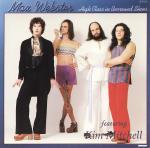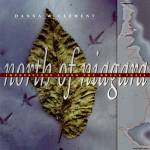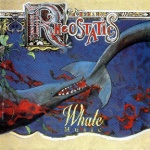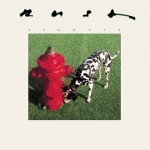I’ve mentioned a few times that I’m from Canada, and that I maybe sometimes don’t show the necessary respect for the wealth of musical talent this country contains. Once Canada became the spiritual home of indie rock, I really got turned off. I prefer music made by people who sound like they’re trying, at least. And my time slogging it out in bands that maybe should have had a shot (and would have had a shot if we lived in Germany) but didn’t get anywhere doesn’t help cure my bad attitude any. So mea culpa, all right?
But that doesn’t mean talented Canadians with something of substance to offer have not occasionally broken through and gained some exposure. I should note that you can find some newer efforts by Canadian people reviewed already here on the blog (such as Altus, who makes several quality albums a year — how many of you musicians can say that?).
Still, having recently paid homage to the greatness of Aussie rock, it behooves me to dust off some gems in Canada’s musical crown for those who wish to learn or reminisce about them.
Not sure if The Band is really Canadian. Sure, four fifths of the dudes were, but Levon was SO American that he kind of dominates with his twangy chutzpah. Still, you gotta love “Acadian Driftwood“, which should probably be our national anthem.
 The Grapes of Wrath – Treehouse (1987)
The Grapes of Wrath – Treehouse (1987)
Back when college rock, alternative’s often jangly precursor, was the rage amongst young intellectuals, Americans had REM and The Connells and Camper Van Beethoven and suchlike. In Canada, we had British Columbia’s The Grapes of Wrath, a band that clearly worshiped sixties psych pop and really knew how to jingle-jangle and harmonize. I’m not sure what kind of inroads they made into other markets, but they were pretty omnipresent here. Treehouse, their second album, is a wonderful effort only occasionally marred by boxy eighties production. The songs are little pop jewels, the highlights being “O Lucky Man” (NOT to be confused with ELP), “Peace of Mind” and “Backward Town“, a song that soothed the troubled breast of many’s the sensitive young ‘un pining for a way out of smalltown life. Ironically, now that we’re older we pine for a small town — at least some of us do. But I digress. If you like your Byrdsy songs delivered with appropriate earnestness and gusto, you’ll certainly appreciate this album.
 Max Webster – High Class in Borrowed Shoes (1977)
Max Webster – High Class in Borrowed Shoes (1977)
It’s funny to think that before axe virtuoso Kim Mitchell and his songwriter partner Pye Dubois made lots of moolah writing songs about patio fixtures, cold pop and the myriad ways in which one can rock and party hard, he was in this delightfully odd seventies rock leviathan. Max Webster was an unusual band, often more a sort of hard-rocking version of Zappa’s surrealism mixed with 10cc than a standard arena-rock outfit. There’s plenty of regulation issue seventies boogie-oogie here, but there’s also a twisted lyrical edge that sets the band apart from the Status Quos of the period. A shit-hot riffin’ band that could also play purdy, Max Webster here presents the über-rockingness of “Oh War!” and “America’s Veins“, but also the cuteness of “Diamonds, Diamonds“, and even appear dressed quite bizarrely on the album cover in true glam rock style. Maybe it’s not very sexy, but it sure is interesting music! Of interest to any hard rock or prog-rock aficionado.
 Danna and Clement – North of Niagara (1995)
Danna and Clement – North of Niagara (1995)
You’ll recognize the first name, probably — Mychael Danna just won an Oscar for a score he wrote. But in the past he and his collaborator, Tim Clement, turned out a few works of instrumental/ambient music that are very pretty and should be of interest to lovers of beautiful, tranquil instrumentals. The added bonus pour moi is the theme of the record is the bucolic landscape around my big, stinky, indie-rock-ridden city. Some pieces, like “Cooke’s Paradise”, are piano compositions worthy of Eno and Budd, while others, such as “Ravensview”, are pure ambient music. There are also a few folky touches. I’m sure Danna’s movie work is stellar, but this album is such good ambient that I rather doubt he could improve on it.
Being a musician on the scene, so to speak, in the early nineties, I was exposed to some acts that never really broke through the ceiling to commercial viability, but were fine acts nonetheless. Hell, there were hundreds of them, naturally. One such band is Burlington, Ontario’s Sianspheric, Canada’s very own modern space rock band and the Canuckian answer to shoegaze and that neo-psych The Verve did early in its career. The band only made a couple of albums on smaller labels, but they are very good if you like lots and lots and lots of delay on your axes, and some heavier sounds mixed in à la My Bloody Valentine, Catherine Wheel, etc. This album is one big swoosh of beauteous, glorious noise, swooping and sliding, with the requisite sweet, moody vocals. As an added bonus, the final track, “Where the Planets Revolve, I Wish I Was There”, is a 20-minute ambient rock excursion! File Sianspheric under the “they’d have made it if they were from Manchester” section.
 The Rheostatics – Whale Music (1992)
The Rheostatics – Whale Music (1992)
It’s safe to say there’s probably no band more Canadian than Etobicoke, Ontario’s Rheostatics. And proudly so, which probably limited their appeal outside these environs. The band operated as a true collective, with each band member contributing his own distinct songwriting, from the pop of bassist Tim Vesely, the proggy artiness of the highly skilled lead axeman Martin Tielli, to the punkish energy of the other guitarist, Dave Bidini. Named for a novel by Paul Quarrington, this album contains a wealth of wonderful and imaginative songs. It wouldn’t be far off to call it “art rock”, though it’s not prog — it’s something else altogether, and an undefinable quality is something to cheer on, yes? Proud, uncompromising oddness is evident in the boreal surrealism of “Palomar“, the suburban angst of “Legal Age Life at Variety Store” (we practically invented suburban sprawl around here, I’m afraid) and “Shaved Head“. The Canuckness is not so much in the topics, though, it’s in the feel, man. The accents and suchlike. And the playing is very good as well. A really fine collection of arty rock and pop that more people outside of Canada should have heard at the time, but you still can now.
I love Rush. I really love Rush. I love ’em hard-rockin’, high and screechy. I love ’em soft, smart and synthy. I just love ’em. But different people have widely divergent opinions. Some prefer the harder seventies stuff, kimonos and all. Some prefer the more mature, classier, intellectual version. I prefer the latter, but for a time in the early eighties, we (well, not me, I was eight when this came out) had the best of both worlds on Signals, Moving Pictures and Permanent Waves, each of them a classic album packed with timeless rock artefacts. Signals is probably the least-known, relatively, of the three albums, but overall the songs may be better. Rush adapted to shorter, snappier pieces with ease, and this album contained the immortal “Subdivisions“, catchy as hell and the best song about teen life in the ‘burbs EVER written. I know, cuz I lived it. Check out the absolutely glorious bridge/chorus, whatever it is, of “The Analog Kid” (“You move me, you move me”). And the awesomely sorrowful rumination on the decay of our faculties that is “Losing It“, featuring violin by FM’s Ben Mink. This was a band at the top of its powers, making adult rock music with intelligence, grace and heart. And they’ve stayed on that plateau ever since! Long live Rush!
Quebec has a very strong French-language music scene supported well by the populace, a citizenry that has shown enthusiasm for basically all genres of rock — even when it’s not in French. In the seventies Quebec had a very strong progressive rock scene (see my Harmonium review for more info), and one of the overlooked gems of that scene is this one-off album. And what an album! Pollen took the influences of Genesis, Yes and French prog titans Ange and created a hyper-dramatic symphony of an album with incredibly well put-together pieces in which the jazzy noodling never interferes with the melody. Interspersed with the complex grandiosity of pieces like “Vieux Corps de Vie D’Ange” and “Vivre la Mort” are some really beautiful acoustic pieces such as “L’Indien” and “La Femme Ailee“. The musicianship, the writing, the whole thing is incredible from the first note on. Anyone who likes any kind of progressive rock will benefit from listening to this album, since I declare it one of the best prog-rock albums ever made. I wonder what happened to the members afterward?
Back when Rush was the big name in Canadian progressive rock, FM always had to play second fiddle (no pun intended, as you’ll see), but this album deservedly has a big following amongst proggers. Rush’s softer cousin featured an unusual instrumental lineup of bass, drums, synth, electric violin and electric mandolin, the latter two being played by an enigmatic figure known as Nash the Slash, who performed wrapped up in bandages. Ah, the seventies was a wonderful time. Black Noise is an awesome collection of melodic prog-pop, bombastic sci-fi rock filled with mega-drumming, tasty string synths, incendiary violin solos and really accomplished lead vocals. If you don’t believe me, check out “Aldebaran” and “Journey“. The song “Phasors [sic] on Stun” still gets play on classic rock stations. This may have come out during the waning years of prog-rock, but it sounds dang timeless to me. Ambient/synth aficionados will appreciate it as well.
 Blue Rodeo – Nowhere to Here (1995)
Blue Rodeo – Nowhere to Here (1995)
Blue Rodeo is a Canadian institution, the country’s premier country rock band with roots planted firmly in the music of The Byrds and Burritos, meaning country rock with an occasional psychedelic tinge. The latter is mainly courtesy of co-mainman Greg Keelor, who functions as the darker yin to the more upbeat balladeering yang of Jim Cuddy. Over the years a certain sameness has entered their work, as it does I guess for most, except for the times when Keelor goes off and tries something ambitious and wacky. Which he did on this album, the band’s underrated masterpiece. Keelor stretches out into truly psychedelic territory on songs like “Girl in Green” and “Side of the Road“, so much so that Cuddy’s lighter fare is a welcome melodic interjection rather than a hindrance, and provides balance to the proceedings. The murky keyboards, wild soloing and disregard for song length make for a pretty impressive trip, as does the overall melancholic, November-in-a-crumbly-farmhouse mood. The highlight is the very emotional and beautifully produced epic “Flaming Bed“, one of the best piano ballads I’ve ever heard. I wish the group had done more work like this.
 The Lowest of the Low – Hallucigenia (1994)
The Lowest of the Low – Hallucigenia (1994)
For a brief period in the nineties, it looked like Toronto’s “Low” was going to be the world’s next great band, an awesome live act with absolutely top-shelf songwriting, personality to match and a confident swagger to boot. Main songwriter Ron (not Rompin’ Ronny) Hawkins channelled a bit of Joe Strummer in his literate power-pop, and there was a definite buzz around the band. Well, I don’t really know what happened to end that halcyon period, even though I once played in a band with the former bass player. None of my business. There have also been sporadic reunions. Anyway, while the band’s first independent release did gangbusters, they followed it up with this equally muscular collection of manly but sensitive and smart rock, on which I prefer the songwriting to the first. As evidence I offer the pulsing bass groove of “Gamble“, the frenetic punk energy of “Beer, Graffiti Walls“, and the rather disturbing issue-based “7th Birthday“. In some ways The Lowest of the Low could have been the band that The Replacements could have been, if you know what I mean. At least this album still exists as evidence.





I have always really liked the song “Subdivisions” (though I did not “live it”) because it’s so dark. I’m also a fan of Max Webster!
LikeLike
Rushhhhhhhhhhhhhhhh
LikeLike
Great list! Wonderful to see FM and Max Webster on it.. Rush’s Signal’s is a surprise choice (Moving Pictures or 2112 is the usual). Will check out Danna & Clement.. I like alot of Danna’s film and tv scores.
LikeLike
Yeah, and I like Hold Your Fire even better! Time Stand Still!
Danna/Clement made a few albums, of which I have two- both are very good.
LikeLike
I have a soft spot for all of Rush’s 80s period – they get dumped on alot for using too many synths, but I find it’s their most melodic period. I bought every single record as soon as it came out until Presto… it got too ‘rock-riff’ based, and low on singable melodies after that.
LikeLike
I worked with a guy who was a little bit off the mark mentally and he used to wander around repeating…”listen to the music music everything below is cancer” and he said it was from a Max Webster song. I harshly judged the band by the cover and never bothered to listen.
LikeLike
Ha – that’s understandable. A similar workplace experience turned me off the Doobie Brothers forever!
LikeLike